
Robert Fergusson was a Scottish poet. After formal education at the University of St Andrews, Fergusson led a bohemian life in Edinburgh, the city of his birth, then at the height of intellectual and cultural ferment as part of the Scottish enlightenment. Many of his extant poems were printed from 1771 onwards in Walter Ruddiman's Weekly Magazine, and a collected works was first published early in 1773. Despite a short life, his career was highly influential, especially through its impact on Robert Burns. He wrote both Scottish English and the Scots language, and it is his vivid and masterly writing in the latter leid for which he is principally acclaimed.
"To a Mouse, on Turning Her Up in Her Nest With the Plough, November, 1785" is a Scots-language poem written by Robert Burns in 1785. It was included in the Kilmarnock volume and all of the poet's later editions, such as the Poems, Chiefly in the Scottish Dialect . According to legend, Burns was ploughing in the fields at his Mossgiel Farm and accidentally destroyed a mouse's nest, which it needed to survive the winter. In fact, Burns's brother, Gilbert, claimed that the poet composed the poem while still holding his plough.

Poems, Chiefly in the Scottish Dialect, commonly known as the Kilmarnock Edition, is a collection of poetry by the Scottish poet Robert Burns, first printed and issued by John Wilson of Kilmarnock on 31 July 1786. It was the first published edition of Burns' work. It cost three shillings and 612 copies were printed. The volume was dedicated to Gavin Hamilton.

Robert Burns, also known familiarly as Rabbie Burns, was a Scottish poet and lyricist. He is widely regarded as the national poet of Scotland and is celebrated worldwide. He is the best known of the poets who have written in the Scots language, although much of his writing is in a "light Scots dialect" of English, accessible to an audience beyond Scotland. He also wrote in standard English, and in these writings his political or civil commentary is often at its bluntest.
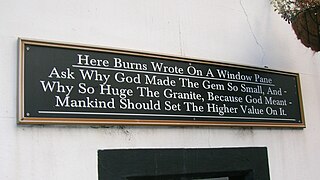
Robert Burns came to know James Cunninghamme, Earl of Glencairn in Edinburgh in 1786 through a 'Letter of Introduction' provided by Dalrymple of Orangefield who was married to Lady Glencairn's sister. The Earl received the poet warmly in his house and introduced him to his friends. One of several gifts from the earl to the poet was a diamond point pen, stylus, or cutter which he used to write upon many windowpanes and glasses, scribing verse, his signature, epigrams, or other writings for posterity. Many of these diamond-point engravings survive, some however are contentious as regards either their authenticity, meaning, or both.

Kate Kemp of Barskimming lived with her father at the Bridge House on the northern side of the single span Barskimming Old Bridge, River Ayr, Scotland. Both Robert Burns and James Andrew, the miller at Barskimming Mill, had a romantic interest in her and one visit led to the composition of the poem and dirge "Man was made to Mourn".

Poems, Chiefly in the Scottish Dialect is commonly known as the first Edinburgh Edition and the partial second setting has become known as the Stinking Edition. It is a collection of poetry and songs by Robert Burns, first "Printed for the Author" by William Smellie in Edinburgh and published or "Sold by William Creech" of Edinburgh on the 17 April, an announcement being made in the Edinburgh Advertiser on that date, although the date 21 April 1786 is given by a few authors. The Kilmarnock Edition made Robert Burns Caledonia's Bard whilst the 'Edinburgh Edition' elevated him into a position amongst the world's greatest poets.
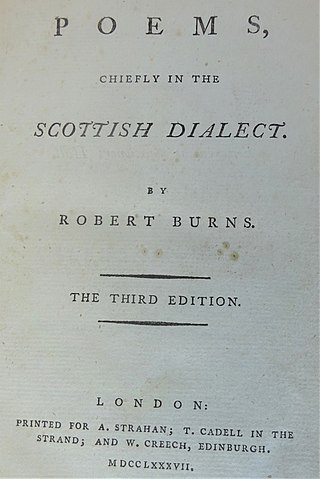
Poems, Chiefly in the Scottish Dialect is commonly known as the Third or London Edition and sometimes the Stinking Edition. It is a collection of poetry and songs by Robert Burns, printed for A. Strahan; T. Cadell in the Strand; and W. Creech, Edinburgh. MDCCLXXXVII The date of publication for the London Edition was in November 1787, however Strahan and Cadell had previously advertised for sale the 'Second' or 'Edinburgh Edition' using the 500 or so copies that William Creech still had that were unsold. The successful selling of these made a truly new 'London Edition' a commercially viable enterprise.

The Glenriddell Manuscripts is an extensive collection written in holograph by Robert Burns and an amanuensis of his letters, poems and a few songs in two volumes produced for his then friend Captain Robert Riddell, Laird of what is now Friars Carse in the Nith Valley, Dumfries and Galloway. The two volumes of the manuscript were handsomely bound in calf leather. The first volume of poems and songs was completed by April 1791 and was presented to Robert Riddell, however their friendship ceased due to the unfortunate 'The Rape of the Sabine Women' incident and Robert Riddell died shortly after before any reconciliation could take place. The first volume is partly in Burns's hand with one main amanuensis contributing much of the text in a far neater hand than the author himself and a possible third person contributing to the text. The second volume is entirely in Burns's hand.

Poems, Chiefly in the Scottish Dialect was issued during the poet's lifetime In Two Volumes. The Second Edition Considerably Enlarged. It is a collection of poetry and songs by the poet Robert Burns, printed for T. Cadell, London, and W. Creech, Edinburgh. M,DCC,XCIII The date of publication for this edition was 16 February 1793 as advertised in the Edinburgh Courant. The successful demand for the 1787 Edinburgh Edition seems to have encouraged Creech to publish this new edition as the 1787 volume had been sold out since around 1791.

Robert Burns's Commonplace Book 1783–1785 is the first of three commonplace books that were produced by the poet. The contents cover drafts of songs and poems, observations, ideas, epitaphs, etc.

'Robert Burns's Interleaved Scots Musical Museum' or the 'Interleaved Glenriddell Manuscript' is a set of four octavo volumes of James Johnson's The Scots Musical Museum in which Robert Burns provided additional material to the original publication on interleaved sheets and which he eventually gifted to Captain Robert Riddell (1755–94) of Friars Carse, Dumfries and Galloway, Scotland.
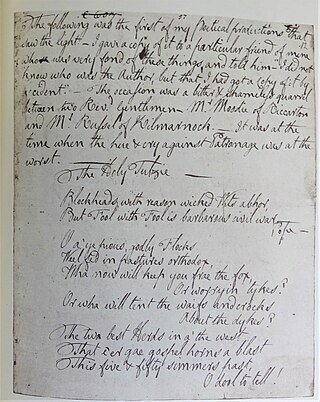
'The Holy Tulzie', 'The Twa Herds' or 'An Unco Mournfu' Tale was a poem written in 1784 by Robert Burns whilst living at Mossgiel, Mauchline, about a strong disagreement, not on doctrine, but on the parish boundaries, between two 'Auld Licht' ministers, John Russel and Alexander Moodie It was followed by "The Holy Fair", "The Ordination", "The Kirk's Alarm", "Holy Willie's Prayer", etc.
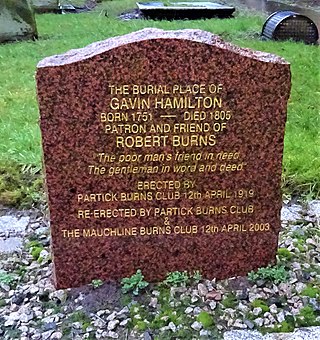
Gavin Hamilton was one of Robert Burns's closest friends and a patron. The first 'Kilmarnock Edition' of his poems were dedicated to Gavin Hamilton.

The surviving manuscript of the instructional work A Manual of Religious Belief is written in the form of a theological dialogue between father and child written out in holograph by John Murdoch for William Burnes, Robert Burns's father. William had started to compose and compile the work before Robert Burns's birth and wrote the first rough draft that has not survived. This work was originally composed with a stronger Scots language content that Murdoch modified, as well as making grammatical corrections.

John Ballantine (1743–1812), was a Scottish merchant and banker and one of the greatest friends, admirers and closest confidants of Robert Burns. Significantly Ballantine gave the poet advice on the selection of poems for his First Kilmarnock Edition as well as being asked for his opinion on the bard's poems.

Alexander Cunningham was one of Robert Burns's closest friends from his time in Edinburgh. They stayed in contact, through at least 19 letters from the poet; and Cunningham was the ardent admirer who encouraged and joined others such as John Syme to raise funds for the poet's family after his death. Cunningham was one of the small group of associates whom Burns actively approached for constructive criticism of his work.
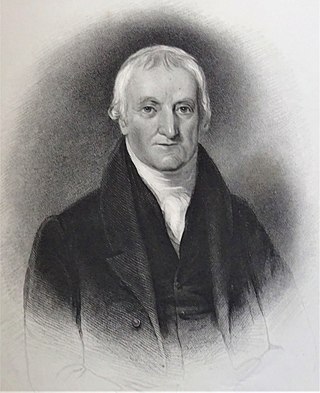
John Syme was a Scottish lawyer and one of the poet Robert Burns's closest friends during his time in Dumfries. In the summers of 1793 and 1794 he joined Burns on his two short tours of Galloway. Syme and Alexander Cunningham were amongst the most active of the friends and admirers of Burns's works who raised funds for the poet's family and for his mausoleum with the assistance of others such as James Currie. Together with Dr Willam Maxwell he arranged Burns's funeral.
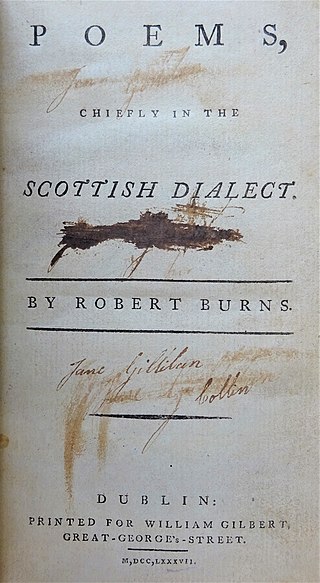
Poems, Chiefly in the Scottish Dialect was the second "pirated" issue of Robert Burns's work, being published in Ireland at Belfast without permission from or payment to the author or publisher. It is a so-called Stinking Edition, carrying the error Stinking for the Scots word Skinking (watery) in the poem "To a Haggis" because the type setters copied from a 1787 Stinking Edition of Poems, Chiefly in the Scottish Dialect. It has been shown to be from the same print setting as the Belfast Edition but with a different title page.

Poems, Chiefly in the Scottish Dialect was a 'pirated' edition of Robert Burns's work, being published in Ireland without permission from or payment to the author or publisher. It is a so-called 'Stinking Edition', carrying the error 'Stinking' for the Scots word 'Skinking' (watery) in the poem "To a Haggis" because the type setters copied from a 1787 'Stinking Edition' of Poems, Chiefly in the Scottish Dialect .






















